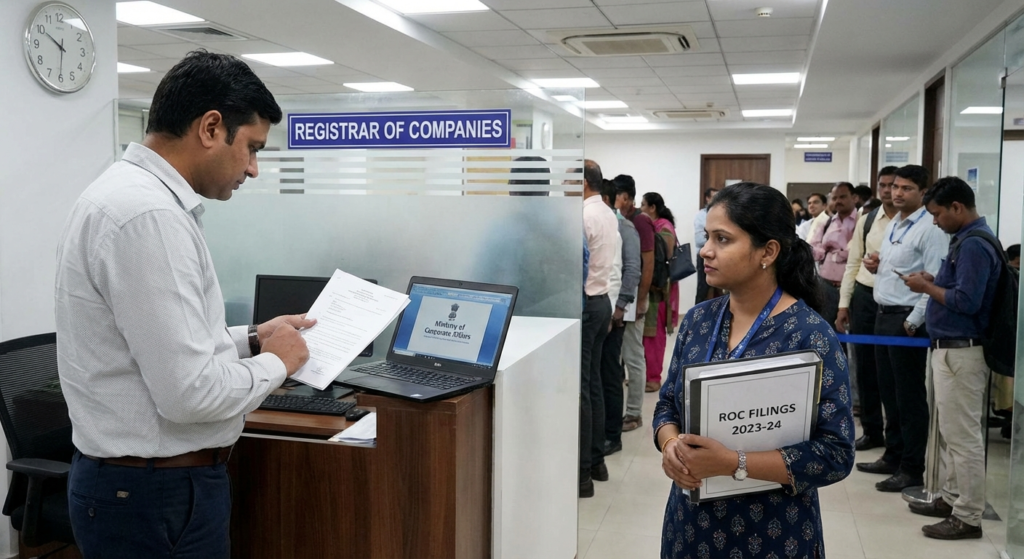Are you ready to start an exciting business journey in India? Before you begin, think about register a small business. This step is key for legal compliance and sets up your business for success. We’ll guide you through the process of register a small business in India, making it easier for you to understand.
Key Takeaways
- Understand the different types of small business structures in India, including One Person Company (OPC), Limited Liability Partnership (LLP), Private Limited Company, and Public Limited Company.
- Determine the right business structure based on factors like number of owners/partners, initial investment, and legal and tax implications.
- Learn the step-by-step process for register a small business, including obtaining a Digital Signature Certificate, applying for a Director Identification Number, and registering on the MCA portal.
- Explore the unique considerations for women entrepreneurs when starting a business in India.
- Discover the benefits of register a small business, such as legal recognition, access to financing, and compliance with regulatory requirements.
Understanding Small Business Types in India
As an aspiring entrepreneur in India, it’s key to know the different small business structures. From simple sole proprietorships to complex private limited companies, each has its own benefits and challenges. Picking the right business type can help you gain valuable advantages and set your business up for success.
One Person Company (OPC)
An OPC is a company with just one person as the member and director. It’s easy to start and offers protection against personal liability. OPCs get tax perks under the Startup India program and have fewer rules than private limited companies.
Limited Liability Partnership (LLP)
The LLP registration combines the best of partnerships and companies. It gives partners limited liability and tax benefits for startups. This structure is great for service businesses or those needing less investment.
Private Limited Company
A private limited company is its own legal entity with its own shareholders and directors. It’s perfect for businesses making a lot of money. It offers tax perks and needs to follow certain rules like filing tax returns and getting audits done.
Public Limited Company
A public limited company is made up of people who work together under company laws. It’s a legal entity with limited liability for its members. These companies can make a lot of money by selling shares. They’re trusted more by investors and customers. But, they have to follow many rules and keep detailed records.
When choosing a business structure in India, think about how many owners you’ll have, your initial investment, and what you want for liability. Knowing the pros and cons of each type will help you pick the best one for your goals.
| Business Entity | Pros | Cons |
|---|---|---|
| Sole Proprietorship |
|
|
| Partnership Firm |
|
|
| One Person Company (OPC) |
|
|
| Limited Liability Partnership (LLP) |
|
|
| Public Limited Company |
|
|
Understanding the pros and cons of each business structure helps you make a smart choice. This choice should match your business goals and set you up for success.
Selecting the Right Business Structure
Starting a business in India means picking the right business structure. This choice depends on how many owners you have, the money you need to start, and what your business aims to achieve.
Consider Number of Owners/Partners
If you’re the only owner and funding the business alone, think about a One Person Company (OPC). But if you have more than one person involved, an LLP (Limited Liability Partnership) or a Private Limited Company might be better.
Evaluate Initial Investment Requirement
The amount you plan to invest at the start is key in choosing the right structure. If it’s a small amount, a sole proprietorship, partnership, or Hindu Undivided Family (HUF) could work. But if you’re putting in a lot of money, consider a private limited company, public limited company, or an LLP.
LLP vs Private Limited Company
Both LLPs and private limited companies need to register with the Ministry of Corporate Affairs (MCA) in India. Companies with big sales often choose a private limited company to raise funds. LLPs are better for small businesses or startups with less money, offering flexible operations and less paperwork.
| Parameter | LLP | Private Limited Company |
|---|---|---|
| Minimum Number of Members | 2 | 2 |
| Liability of Members | Limited | Limited |
| Compliance Requirements | Lower | Higher |
| Raising Funds | Difficult | Easier |
Choosing the right business structure depends on your needs, goals, and business type. If you’re unsure, contact My Digital Filing and get free consultation with professionals and experts.
How to Register a Small Business in India
Registering your small business in India is key to making it official. You can choose from options like One Person Company (OPC), Limited Liability Partnership (LLP), Private Limited Company, or Public Limited. Here are the steps to register your small business in India:
Obtain Digital Signature Certificate
In today’s digital world, a Digital Signature Certificate (DSC) is needed to file forms on the Ministry of Corporate Affairs (MCA) portal. All directors of your company must get a Class 3 DSC from a recognized authority.
Apply for Director Identification Number
Every director of your company needs a Director Identification Number (DIN) to be recognized officially. You must provide the DIN and address proof of all directors when registering your company.
Register on the MCA Portal
First, you must register on the MCA portal before applying for company registration. The director can log in, access e-filing forms, and submit the needed documents.
Get GST Registration
If your business’s annual turnover is high, you might need to register for Goods and Services Tax (GST). Companies above a certain threshold must register as a normal taxable person under GST.
Obtain Certificate of Incorporation
After your application is approved, the Registrar of Companies will give you a Certificate of Incorporation. This makes your company a legal entity.
Begin your small business journey with My Digital Filing, your go-to for easy company registration in India. Their team will help you at every step, making sure your business is registered right and follows the rules.
Registration Process for Women Entrepreneurs
India is helping women entrepreneurs grow and join the business world. Now, women lead more startups and businesses, jumping from 10% of 6,000 in 2017 to 18% of 80,000 in 2022. It’s key to know how to register and the support they can get.
Choose Business Structure
First, pick the right business structure for your venture. You can register as a One Person Company (OPC), Limited Liability Partnership (LLP), Private Limited Company, or Public Limited Company. Each has its own rules and perks. Think about your business goals, who owns it, and how much you’ll start with to choose wisely.
Get Director Identification Number (DIN)
All directors, including women entrepreneurs, need a Director Identification Number (DIN) from the Ministry of Corporate Affairs (MCA) portal. This number is key for registering your company and is a big step in the process.
Obtain Digital Signature Certificate
You’ll also need a Digital Signature Certificate (DSC) for registration. This digital signature lets you sign documents safely and talk to government sites. Get your DSC from approved Certifying Authorities to keep your business legal.
Register Unique Business Name
Picking a unique and catchy business name is crucial. Make sure it’s not taken by someone else with the Ministry of Corporate Affairs (MCA). This helps your brand be unique and avoids legal issues.
Prepare MOA and AOA Documents
Next, make the electronic Memorandum of Association (eMOA) and Electronic Articles of Association (eAOA) documents. These set out your business’s goals, powers, and rules. Getting these right and submitting them is key for smooth registration.
By carefully going through the registration steps and using support schemes, women entrepreneurs in India can build strong businesses. This opens doors for growth and success.
“Entrepreneurship is the future, and women are the future of entrepreneurship.”
How to Register a Small Business
Starting a small business in India is exciting. The registration process can be made easier with the right guidance. Whether you’re starting fresh or growing your business, knowing how to register is key to success. Let’s look at the main steps to register your small business in India.
Incorporate Your Business
The first step is to incorporate your business. You can pick from different structures like a One Person Company (OPC), Limited Liability Partnership (LLP), Private Limited Company, or Public Limited Company. Each type has its own benefits and rules, so choose the best one for your business.
Register with Startup India
If your business is a startup, you can sign up with Startup India. This gives you tax breaks, self-certification for labor and environmental laws, and access to funding and programs. To join, you need a DPIIT recognition number by submitting the right documents.
Obtain Necessary Registrations and Licenses
You might need different registrations and licenses based on your business type, like a GST registration, Digital Signature Certificate, and Director Identification Number (DIN). Make sure you meet all legal requirements to run your business legally and correctly.
At My Digital Filing, we know how complex registering a small business in India can be. Our experts will help you through the process, making sure your business is registered right and follows all rules. Check out our website at mydigitalfiling.in to see how we can help with your small business registration and what should be the fees.
“Registering your small business is the first step towards building a successful venture in India. Let us handle the paperwork while you focus on growing your business.”
Conclusion
Starting a small business in India means you’ll need to follow legal and administrative steps. This guide has shown you the main steps to register your business. It covers picking the right business type to finishing all the paperwork.
If you’re new to business or have been doing it for a while, this info will help you register your business in India with confidence. My Digital Filing is ready to help you during the registration process. They offer the services and support you need for a smooth experience. Check out their website at https://mydigitalfiling.in/ to see how they can assist with your small business registration India or startup registration India.
With the right insights and resources, you can set up your small business registration India or startup registration India. This will let you start your business journey with confidence. Remember, success begins with a strong foundation. My Digital Filing is here to help you reach your business goals.
FAQ
Q: What are the types of small businesses in India?
A: In India, small businesses can be One Person Company (OPC), Limited Liability Partnership (LLP), Private Limited Company, or Public Limited Company.
Q: What factors should I consider when choosing the right business structure for my small business?
A: Think about how many owners you have, your budget, and if an LLP or Private Limited Company fits your needs.
Q: What are the key steps to register a small business in India?
A: First, get a Digital Signature Certificate. Then, apply for a Director Identification Number. Next, register on the MCA portal and get GST registration. Finally, obtain the Certificate of Incorporation.
Q: What are the unique challenges faced by women entrepreneurs in India?
A: Women entrepreneurs face economic hurdles due to investor biases. They struggle to get funding and financing for their ventures.
Q: How can I register my startup with the Startup India initiative?
A: Start by incorporating your business and registering with Startup India. Then, get DPIIT recognition and submit your documents. Finally, get a recognition number to enjoy tax exemptions, self-certification, and funding chances.
Please Rate this post
Click to rate











